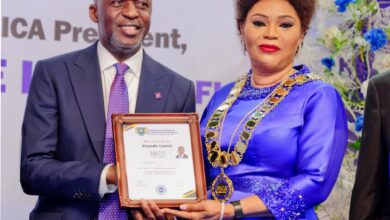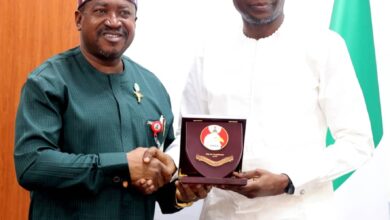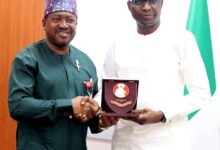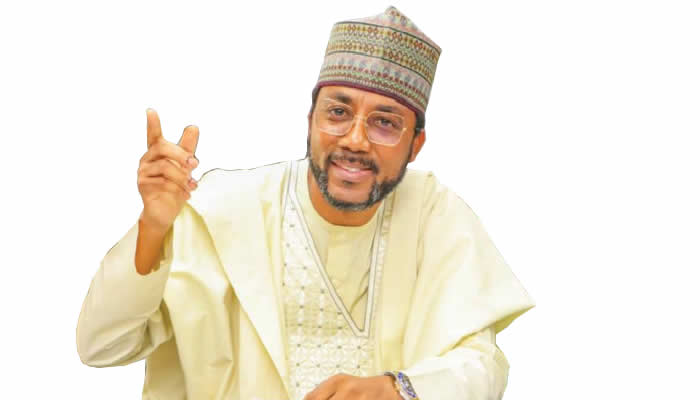
Thoroughly equipped with a track record of excellence in Nigeria’s private sector led financial system combined with a hands-on public sector experience as Executive Director Finance and Administration who was responsible for leapfrogging the Nigerian Ports Authority’s revenue to unprecedented levels, Mohammed Bello-Koko had since coming into the saddle as CEO in 2021 deployed a three-pronged strategic artifice of: people, technology and infrastructure and equipment to turn the fortune of the NPA around, Joshua Okoria writes
The Nigerian economy has faced many challenges in the past several years with many players in the public private sector struggling to survive.
However, a few have braved the odds, recording outstanding performance amidst tough operating environment. One of such institution is the Nigerian Ports Authority (NPA). Even at the quickest glance it is evident that a new paradigm of public resource management is governing the affairs of the Nigerian Ports Authority.
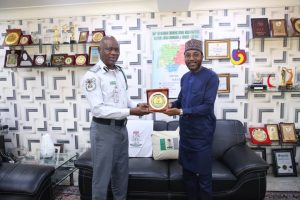 The NPA whose operational excellence is pivotal to President Bola Ahmed Tinubu’s vision to unleash Nigeria’s marine and blue economy potentials for economic recovery and growth appears to have moved beyond rhetoric to value delivery.
The NPA whose operational excellence is pivotal to President Bola Ahmed Tinubu’s vision to unleash Nigeria’s marine and blue economy potentials for economic recovery and growth appears to have moved beyond rhetoric to value delivery.
Feelers from industry watchers reveal that the Chief Executive Officer of the NPA in the period under review, Mohammed Bello-Koko, thoroughly equipped with a track record of excellence in Nigeria’s private sector led financial system combined with a hands-on public sector experience as Executive Director Finance and Administration who was responsible for leapfrogging the agency’s revenue to unprecedented levels had since coming into the saddle as CEO in 2021 deployed a three-pronged strategic artifice of: People, Technology and Infrastructure & Equipment.
People
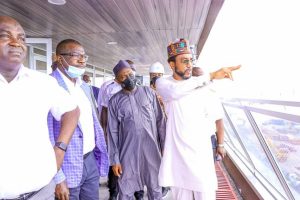 In a prompt response to the human resource imperative, the authority in the period under review, secured the necessary approvals for the increase in salary of its employees, which had stagnated for over fifteen (15) years.
In a prompt response to the human resource imperative, the authority in the period under review, secured the necessary approvals for the increase in salary of its employees, which had stagnated for over fifteen (15) years.
The combination of improved operational performance of the ports, tightening of collection mechanisms, plugging of income leakages and debt recovery resulted in unprecedented revenue generation and remittances to the Consolidated Revenue Fund (CRF) of the federation, with revenues steadily growing from N317 billion in 2020, N333.5 billion in 2021, to N361 billion in 2022; and remittances progressively soaring from N80 billion in 2020 to N93.4 billion by financial year end 2022, which the authority is poised to surpass in 2023 based on the sum of about N90 billion already contributed into the CRF for January to August 2023 is rooted in the prompt response to the human capital needs.
In a confirmation of the validity of the authority’s fresh initiatives, the Bureau for Public Service Reforms (BPSR) in its 2023 evaluation of government agencies adjudged the NPA as a level 5 “Platinum Level” Organization due to the provision of an enabling environment for exceptionally high-quality of work in all essential areas of responsibility, resulting in an overall quality of work that is superior, exceptional, and unique.
To stem capital flight in the face of dwindling foreign exchange earnings, the authority reconstructed the dockyard training school, expanded the bridge simulator at the Port Training Institute and equipped it to international certification standards making it unnecessary to send employees for training overseas, thereby saving the country foreign exchange that would expended for foreign training.
Linked inextricably to people management, is the administration’s uncommon realization that there is a cost attached to every hour lost to down tooling, which motivated its sustained engagements with Senior Staff Association of Statutory Corporations & Government Owned Companies (SSASCGOC: TUC), Maritime Workers Union (MWUN:NLC) and other ancillary sector unions which has culminated in the industrial harmony being witnessed.
In keeping with International Maritime Conventions on Shore Leave for Seafarers, the Authority recently reconstructed and equipped the Mission to Seafarers (MTS) facility in Lagos to best-of-its-kind in the region. The MTS is a global index of port rating and national reputation.
Technology
With technology being the linchpin of port efficiency, the authority’s sustained updating of ports systems automation as well as the ongoing collaboration with the IMO for the development of the Port Community System (PCS) signposts the current Management team’s seriousness to advance Nigeria’s trade fortunes.
The PCS which lays the groundwork for the National Single Window (NSW- the global benchmark of port efficiency), is a sector-specific automated system that eases information exchange between all parties that have activities related to the seaports, the Nigerian Ports Authority (NPA) has been at the forefront of measurable actions steps necessary to operationalize the PCS.
Although the PCS by its operational dynamics requires multi-agency actions, which have been time consuming, the NPA as Nigeria’s foremost trade facilitation platform has through advocacy and collaborations fast tracked the process and as at date completed the second phase of the consultancy under the technical guidance of the International Maritime Organization (IMO).
To enthrone transparency and eliminate opacity, the Authority has also completed the automation of port-ship reception and billing payment with the Revenue invoicing and management system (RIMS), Deployment of Electronic manifest and Ship Entry Notice (ESEN), deployed electronic Traffic Management System (e-Call Up), currently operates Oracle Financials and Oracle HR and is on track for the procurement of software for harbour automation and is implementing an Authority-wide equipping and strengthening of Radio Signal Stations.
To assure Domain Awareness Capability to enable the Authority guide and provide safety information to vessels within its channels and ports approaches in line with the Safety of Lives at Sea (SOLAS) convention, the current management partnered with the NLNG Ship Management Ltd (NSML) for the deployment of Vessel Traffic Service which at its conclusive stage.
Infrastructure & Equipment
Ports sustainability is dependent on quality infrastructure and equipment. Whilst awaiting the necessary approvals for the funding of the reconstruction of the aged Tin Can Island Ports Complex and rehabilitation of challenged aspects of all Port locations, the current Management team has in the period under review undertaken commendable steps in this direction as follows:
Acquisition of first-of-its-kind in Africa marine crafts such as the recently commissioned two units of Azimuth Stern Drive (ASD) 8213 model 80 Ton Bollard Pull Tugboats to enable the berthing of very large vessels of 300 metres LOA and above.
Equipping and Operationalization of state-of-the-art Control Towers for Lagos and Tin can Island Port Complexes.
Procurement and deployment of Security Patrol Boats (SPBs) across all Port locations leading to enhanced channel security and address incessant attacks of vessels along the channels and at ports’ waterfronts which has resulted in unprecedented cargo traffic in the Eastern Ports especially Onne Port Complex.
-Acquisition of more Harbour Crafts (Tugboats, Pilot Cutters) to eliminate delays associated with berthing and sailing of vessels and improve efficiency at the Ports.
Procurement and installation of navigational Aids and Buoys for Warri and Calabar Pilotage Districts, for proper channel marking and route mapping.
Completion of the Road Network for the integration of Berth 9,10, &11 at Federal Ocean Terminal, Onne Port.
Procurement and Installation of Marine Fenders Authority Wide. This is to boost the overall integrity of the quay facilities and serve as a precautionary measure to prevent any form of accident arising from direct vessel impact on the quay wall.
Completion of Consultancy services for the shore protection and rehabilitation of the Escravos breakwaters.
Survey and Mapping of Warri Pilotage District from Fairway Buoy-Warri-Sapele up to Koko Port to the prescribed standards of the UKHO Charts, which had been left unattended for decades.
In addition to the above, the three-pronged transformational strategy of the Mohammed Bello Koko – led Management of the NPA has actualized the following: New Ports Development
In a bid to position Nigeria to optimize the comparative advantages that the nation’s maritime endowments as a littoral nation confers, the Authority provided the technical guidance and fast tracked the approval processes responsible for the commencement of operations of Nigeria’s first Deep Sea Port; Lekki Deep Sea Port which doubles as Nigeria’s first fully automated port at take-off.
The Lekki Deep Sea Port laid the groundwork for the recent Federal Executive Council (FEC) approval of Badagry Deep Sea Port, Ondo Deep Sea Port, Snake Island and Koko Port in Delta State.
Trade Facilitation, Promotion of Export
Cognizant of the importance of balance of trade in strengthening the value of the naira, the NPA under Bello Koko’s watch certified and licensed 10 Export Processing Terminals (EPTs) in Lagos and Ogun states in the first instance. The EPTS were conceptualized to eliminate all procedural bottlenecks that hitherto made Nigerian exports uncompetitive in the international marketplace.
The authority in the period under review also successfully enforced the Stevedoring Regulations, which in addition to deepening professionalism and adherence to global best practice in the maritime sector, created jobs and wrested huge revenue from International Oil Companies (IOCs) that was hitherto lost. Creation of new businesses and attendant job opportunities such as the Barge Operations services which apart from reducing pressure on the roads has grown into a N2 billion annual generation business both from direct investment and accompanying externalities.
The NPA has also embarked on the Licensing of additional Truck parks to increase capacity of truck parks servicing the Lagos Ports.
Also, there has been a significant reduction in truck turn-around time due to successful implementation of the E-Call Up System.
The NPA has also ensured the enforcement of Minimum Safety Standards on trucks, which stipulates that all trucks accessing the Ports are inspected, certified, and issued safety assurance identification.
Others are: 65% reduction in number of accidents recorded, arising from improved standards of trucks operating within the Port premises and tandardization of operational procedures for different activities such as barging, private jetties, pilotage, vessel berthing/sailing etc.
Diversification of Revenue Sources
In a move that is indicative of the readiness and capacity to fit into the reinvigorated capacity optimization drive of the new Ministry of Marine and Blue Economy under the visionary ministerial direction of His Excellency Adegboyega Oyetola, and in a bid to surpass the current revenue performance,
Mohammed Bello Koko and his team are already looking beyond sole dependence on revenue from core port operations and have already put modalities in place to create jobs and add value to the national economy from the following alternative sources of revenue through Public Private Partnerships; Ports Independent Power Production,
Bunkering Stations, Fallow Lands for Logistics/Real Estate, Fresh Water Provision, Ship Repairs and Maintenance and Tourism and Hospitality.
Gleaned from the foregoing, it is evident that the Nigerian Ports Authority has been placed on sound footing to guarantee its growth, competitiveness, and future readiness to maximize the opportunities inherent in the the African Continental Free Trade Area (AfCFTA) Agreement.







